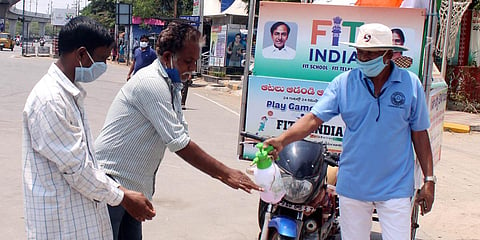COVID-19: Rapid testing must be started with immediate effect in Telangana, feel experts
HYDERABAD: Rapid testing to map COVID-19’s spread has been a hot topic across the globe, but it was not being discussed enough in Telangana as a potential screening mechanism. Experts believe that rapid testing needs to be designed and started with immediate effect in the State.
When the number of cases was at the 400-mark, the State Health Ministry said that rapid testing would not be required yet as there was no community transmission. But, as the numbers rose over the last week, IT Minister KT Rama Rao, during his #AskKTR session, said the option of using rapid testing at containment zones was being discussed.
Speaking to Express, Dr Rakesh Mishra, director of the Centre for Cellular and Molecular Biology (CCMB), said, "Rapid testing is required today, right now because if you can test large number of people quickly, you can decide whether to lift the lockdown, extend it, understand which areas are heavily affected or how the infection is spreading. So, it is very much needed, which is why every State in the country is desperate to test large numbers of people quickly."
"This required because if the lockdown is lifted, chances are that all the effort put in to flatten the curve might get reversed as people will start coming into the social foray again, leading to community transmission which we have managed to avoid till now. However, you cannot continue with the lockdown forever, thus mapping the disease with rapid testing needs to be done," he said.
Further explaining what rapid testing is, Dr Mishra said, "It is not a specific technical procedure. There are various approaches to it. The one that is important in this scenario is anti-body based testing, which is mostly a screening procedure and not a very reliable confirmation procedure. This is because, absence of anti-bodies does not mean that there is no virus, especially in the early stages of the infection. Additionally, the presence of anti-bodies does not mean presence of infection as the virus may be gone, but the anti-bodies could be hanging back for several weeks. Therefore, it is mostly used as a screening process."
Dr Mishra explained about a new technology that has emerged, called LAMP PCR (Loop-mediated isothermal amplification). "This has a very low throw. Most of the times, if you want to test large numbers of people, pooling of samples should be done. This is a strategy that should be adopted based on experience of how the situation has evolved, and then you can collect several more folds of samples — three to four folds — to work on them," he said.
But, is there a requirement for a special rapid testing kit?
"Rapid testing is not specific to any viral infection, because all rapid tests have a low throw. A rapid test can be done in five minutes, but right now we need to know if we can test thousands of people in a day with the available infrastructure. Even if we acquire a kit that gives results in a minute, we will be able to test a maximum of 500-600 people in a day. So, right now we have to figure out a way to rapid test thousands in a day," he said.

